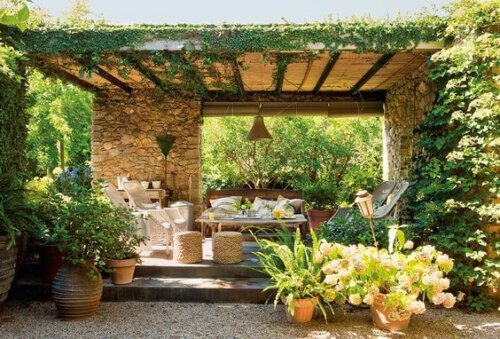How to Divide Your Living Room into Two Sections

These days, living rooms are getting smaller and smaller. Consequently, living rooms that have two sections, or a conjoined room, are becoming common sights in home design. Creating two separate sections in just one room is an efficient way to optimize on space.
We can’t always find a living room that has everything that we’re looking for, so it’s also a way to adapt the room to our needs.
A room that has multiple sections doesn’t have to be disorganized, or chaotic.
However, to prevent such a result, we need to try differentiating the separate sections without completely cutting them off from each other. If that’s what happens in your case, at least try to avoid using physical or visual barriers.
For example, if the way we separate the different sections ends up blocking the natural path of light, we’ll end up making our living room look smaller and that’s not what we’re after.
First and foremost, we need to make sure that the living room, despite having different sections, looks spacious and well-lit.
- Ideas for Hiding Cords for a Beautiful Living Room
- Decorating your Living Room with Pastels
- The Importance of the Coffee Table in your Living Room
In our post, enjoy some of our ideas for successfully creating a living room with different sections.
Why is it so important to separate sections?
In some cases, creating different sections in one room isn’t a question of want but rather, of necessity.
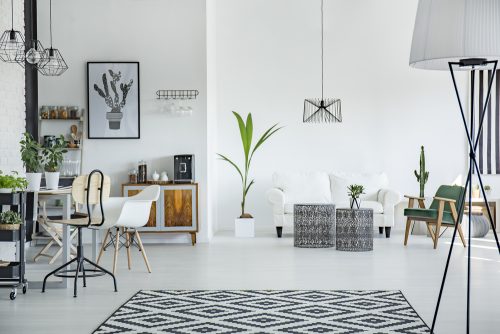
As we mentioned previously in our post, homes are getting smaller and smaller, which sees a rising need to adapt them to our lifestyles.
Consequently, houses that have a living room with a small office or dining room are becoming more common.
As for loft-style homes, sectioning the living room into separate areas is actually fundamental. Creating sections could help us:
- Keep things organized.
- Use space more practically as each item has its own spot.
- Make the best use of space.
How can we create two different sections in our living room?
Our living room might be one of the bigger rooms in our house. This allows us to divide up the room into different sections.
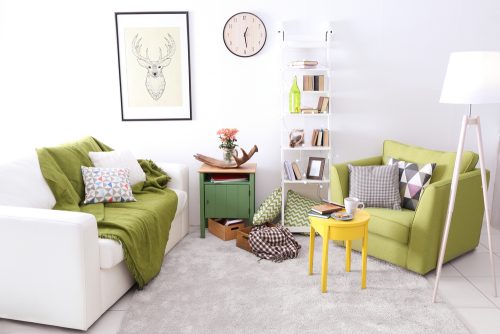
What kinds of sections can we create in our living room?
- Dining area
- Reading space
- Dining area and kitchen
- Office space
To make these different combinations work well together, while still looking good, you have to understand that the key lies in how you separate these different spaces.
Knowing how to separate
Whatever the different sections you want to include in your living room might be, the elements described below are going to be essential for creating a harmonious living room with two sections.
Sofas, lamps and rugs
If you want to create a top-notch living room with two different sections, you can separate them by using your furniture and decorative pieces.
As an example, try moving your sofa behind the dining table to differentiate the spaces.
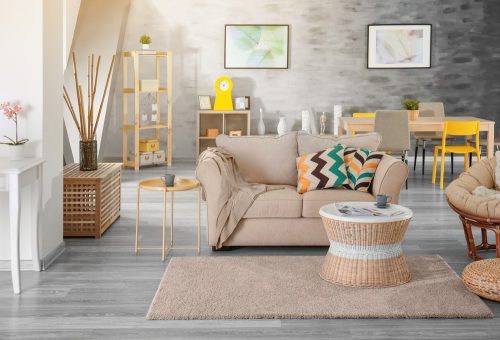
Another idea might be hanging up some ceiling lamps over your dining table and over other strategic areas in your living room. Or, use a rug in the sitting area and not in the dining area.
It’s all about playing around with different elements.
Kitchen islands
Kitchen islands are also a great way to separate a living room into two sections.
They work especially well because they connect the kitchen to the living room, which in turn allows the living room to be a part of the kitchen while still being a different area.
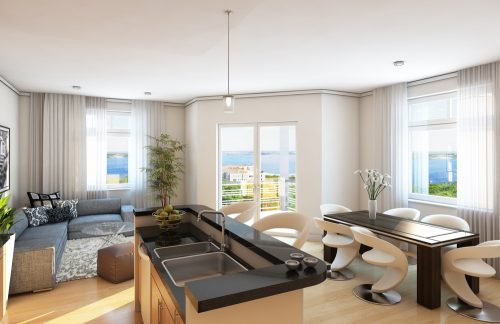
There are all kinds of kitchen islands available. Many of them also go by “auxiliary side tables” as well because they’re not stationary.
This idea will also work wonderfully for a dining area.
Shelves to divide a living room into two sections
Shelves also are awesome for creating two separate sections in the living room.
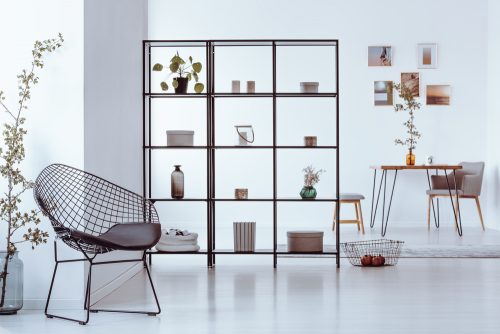
In addition to dividing the living room, they’re practical as they provide a space to keep your books.
Transparent items
Transparent objects can offer us a big hand when we create a living room with two separate spaces.
First off, they’re items that don’t get in the way visually. Thanks to that quality, they don’t create visual barriers.
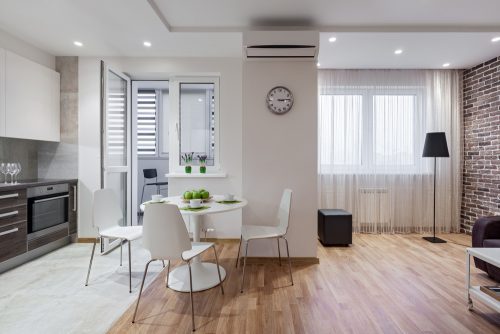
Secondly, their transparency allows light to completely pass through, creating a more spacious illusion. Chairs, tables and even glass walls for closing off an area are all great examples.
In the latter case, the transparency allows us to keep an eye on what’s happening on the other side despite it being a completely different section of the room.
Conclusion
You need to be creative to play around with the elements if you want to create a two-sectioned living room.
There are other ways to separate the spaces in your living room, too. You could even use decorative panels, tall plant pots, etc.
These days, living rooms are getting smaller and smaller. Consequently, living rooms that have two sections, or a conjoined room, are becoming common sights in home design. Creating two separate sections in just one room is an efficient way to optimize on space.
We can’t always find a living room that has everything that we’re looking for, so it’s also a way to adapt the room to our needs.
A room that has multiple sections doesn’t have to be disorganized, or chaotic.
However, to prevent such a result, we need to try differentiating the separate sections without completely cutting them off from each other. If that’s what happens in your case, at least try to avoid using physical or visual barriers.
For example, if the way we separate the different sections ends up blocking the natural path of light, we’ll end up making our living room look smaller and that’s not what we’re after.
First and foremost, we need to make sure that the living room, despite having different sections, looks spacious and well-lit.
- Ideas for Hiding Cords for a Beautiful Living Room
- Decorating your Living Room with Pastels
- The Importance of the Coffee Table in your Living Room
In our post, enjoy some of our ideas for successfully creating a living room with different sections.
Why is it so important to separate sections?
In some cases, creating different sections in one room isn’t a question of want but rather, of necessity.

As we mentioned previously in our post, homes are getting smaller and smaller, which sees a rising need to adapt them to our lifestyles.
Consequently, houses that have a living room with a small office or dining room are becoming more common.
As for loft-style homes, sectioning the living room into separate areas is actually fundamental. Creating sections could help us:
- Keep things organized.
- Use space more practically as each item has its own spot.
- Make the best use of space.
How can we create two different sections in our living room?
Our living room might be one of the bigger rooms in our house. This allows us to divide up the room into different sections.

What kinds of sections can we create in our living room?
- Dining area
- Reading space
- Dining area and kitchen
- Office space
To make these different combinations work well together, while still looking good, you have to understand that the key lies in how you separate these different spaces.
Knowing how to separate
Whatever the different sections you want to include in your living room might be, the elements described below are going to be essential for creating a harmonious living room with two sections.
Sofas, lamps and rugs
If you want to create a top-notch living room with two different sections, you can separate them by using your furniture and decorative pieces.
As an example, try moving your sofa behind the dining table to differentiate the spaces.

Another idea might be hanging up some ceiling lamps over your dining table and over other strategic areas in your living room. Or, use a rug in the sitting area and not in the dining area.
It’s all about playing around with different elements.
Kitchen islands
Kitchen islands are also a great way to separate a living room into two sections.
They work especially well because they connect the kitchen to the living room, which in turn allows the living room to be a part of the kitchen while still being a different area.

There are all kinds of kitchen islands available. Many of them also go by “auxiliary side tables” as well because they’re not stationary.
This idea will also work wonderfully for a dining area.
Shelves to divide a living room into two sections
Shelves also are awesome for creating two separate sections in the living room.

In addition to dividing the living room, they’re practical as they provide a space to keep your books.
Transparent items
Transparent objects can offer us a big hand when we create a living room with two separate spaces.
First off, they’re items that don’t get in the way visually. Thanks to that quality, they don’t create visual barriers.

Secondly, their transparency allows light to completely pass through, creating a more spacious illusion. Chairs, tables and even glass walls for closing off an area are all great examples.
In the latter case, the transparency allows us to keep an eye on what’s happening on the other side despite it being a completely different section of the room.
Conclusion
You need to be creative to play around with the elements if you want to create a two-sectioned living room.
There are other ways to separate the spaces in your living room, too. You could even use decorative panels, tall plant pots, etc.




